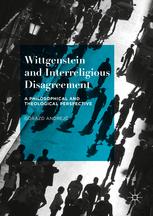

Most ebook files are in PDF format, so you can easily read them using various software such as Foxit Reader or directly on the Google Chrome browser.
Some ebook files are released by publishers in other formats such as .awz, .mobi, .epub, .fb2, etc. You may need to install specific software to read these formats on mobile/PC, such as Calibre.
Please read the tutorial at this link: https://ebookbell.com/faq
We offer FREE conversion to the popular formats you request; however, this may take some time. Therefore, right after payment, please email us, and we will try to provide the service as quickly as possible.
For some exceptional file formats or broken links (if any), please refrain from opening any disputes. Instead, email us first, and we will try to assist within a maximum of 6 hours.
EbookBell Team

5.0
80 reviewsThis book critically examines three distinct interpretations of Ludwig Wittgenstein, those of George Lindbeck, David Tracy, and David Burrell, while paying special attention to the topic of interreligious disagreement. In theological and philosophical work on interreligious communication, Ludwig Wittgenstein has been interpreted in very different, sometimes contradicting ways. This is partly due to the nature of Wittgenstein’s philosophical investigation, which does not consist of a theory nor does it posit theses about religion, but includes several, varying conceptions of religion. In this volume, Gorazd Andrejč illustrates how assorted uptakes of Wittgenstein’s conceptions of religion, and the differing theological perspectives of the authors who formulated them, shape interpretations of interreligious disagreement and dialogue. Inspired by selected perspectives from Tillichian philosophical theology, the book suggests a new way of engaging both descriptive and normative aspects of Wittgenstein’s conceptions of religion in the interpretation of interreligious disagreement.